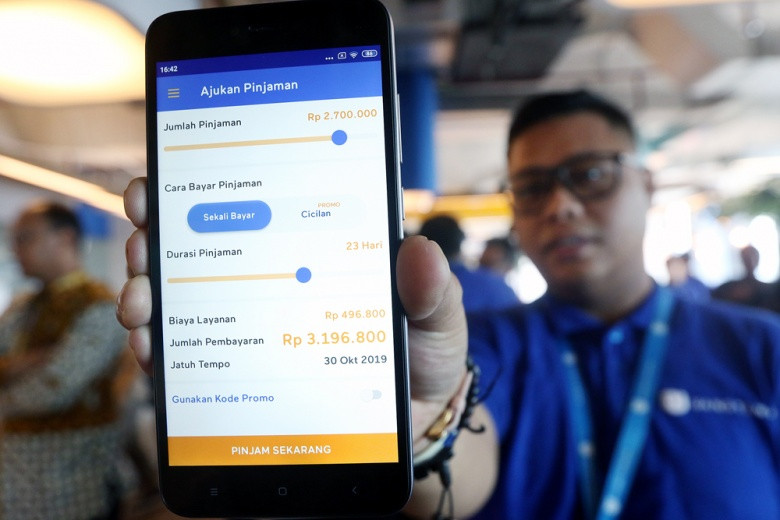Popular Reads
Top Results
Can't find what you're looking for?
View all search resultsPopular Reads
Top Results
Can't find what you're looking for?
View all search resultsBI pushes for open banking development amid data security concerns
BI is currently formulating regulations on open banking standards, which will oblige banks to share their data with fintech companies by creating their own application programming interfaces (APIs).
Change text size
Gift Premium Articles
to Anyone
 A sales officer promotes an app-based loan service to potential customers during an expo in Jakarta. Bank Indonesia has urged the financial industry to develop an open banking system to boost financial inclusion, but a lack of security standards and data protection regulation can hold up the central bank’s latest effort to boost the digital economy. (JP/Dhoni Setiawan)
A sales officer promotes an app-based loan service to potential customers during an expo in Jakarta. Bank Indonesia has urged the financial industry to develop an open banking system to boost financial inclusion, but a lack of security standards and data protection regulation can hold up the central bank’s latest effort to boost the digital economy. (JP/Dhoni Setiawan)
B
ank Indonesia (BI) has urged the financial industry to develop an open banking system to boost financial inclusion, but a lack of security standards and data protection regulation can hold up the central bank’s latest effort to boost the digital economy.
BI payment system policy executive director Erwin Haryono said the data-sharing system would be able to accelerate banks’ digital transformation efforts, adding that the open banking framework would be used to create a unified national payment system by 2025.
An open banking framework mandates banks to share customer data with approved third parties, such as financial technology (fintech) companies, thereby allowing both parties to access data that offer insights into consumer patterns and needs, as well as credit score, among other things.
“Data-sharing among fintech companies is boosting digital transformation in Indonesia’s economy,” Erwin said during a discussion on Wednesday. He called on banks to transform their businesses and collaborate with digital companies to improve consumers’ experience and boost financial inclusion.
The 2018 Financial Inclusion Insights survey, published by the National Committee for Financial Inclusion in November last year, reveals that 55.7 percent of the 6,695 respondents in all provinces of Indonesia already had formal financial accounts with banks, fintech companies or cooperatives in 2018.
That figure is a jump in financial inclusion from 35.1 percent in 2016, and brings the country closer to President Joko “Jokowi” Widodo’s target of 75 percent financial inclusion by the end of 2019. The financial inclusion report for last year has yet to be announced.
The central bank is currently formulating regulations on open banking standards, which will oblige banks to share their data with fintech companies by creating their own application programming interfaces (APIs) from their own systems.
An open banking platform will see traditional banks help digital players reduce technical costs by sharing the know-your-customer (KYC) metrics or loan affordability metrics in an API.
The initiative may reduce borrowing costs for micro, small and medium enterprises (MSMEs) as banks could access MSMEs data provided by digital firms, among other benefits, Erwin went on to say.
Erwin said banks had dominated the retail payment industry back in 2015, but e-payment start-ups such as GoPay and OVO had taken much of the market share four years later, adding that banks should transform their businesses or risk losing the market to non-bank platforms.
According to data provided by the central bank, several banks have transformed their business online, such as private lender DBS with its Digibank platform and state-owned banks (Himbara) with their LinkAja platform, creating an interlink between fintech and banks to contain escalation of shadow banking risk.
The central bank also recorded that electronic transactions increased to Rp 15 trillion (US$1 billion) in May compared to Rp 12.8 trillion in the same period last year. Meanwhile, the central bank recorded e-commerce transactions growing 26 percent during the pandemic.
“This is a golden opportunity for Indonesia’s traditional banks to provide a platform for local fintech players to develop their solutions while ensuring data security and compliance,” Backbase regional director for Asia Riddhi Dutta wrote in a The Jakarta Post op-ed titled “The future of digital banking in Indonesia” published last month.
Several industry players and analysts have raised concerns over a lack of a standardized security system, as well as a lack of data protection regulation, all of which can harm customers.
“The central bank will need to deal with how to maintain the stability of the banking ecosystem and maintain security standards,” World Bank Group senior financial sector specialist Ivan Mortimer-Schutts told the same discussion.
“We should not just let any actors come in and access the crucial source of information and payment systems,” he stressed.
Indonesian Financial Technology Association (Aftech) vice chairman Budi Gandasoebrata said the custodian of the financial services would need to step up security practices ranging from anti-money laundering to consumer protections.
Indonesia Information Communication Technology (ICT) executive director Heru Sutadi noted that the cybersecurity risks remained a huge threat to the country's financial services.
"Therefore, the open banking system will need to be tightly regulated and must ensure cybersecurity safety,” he said on Wednesday.









